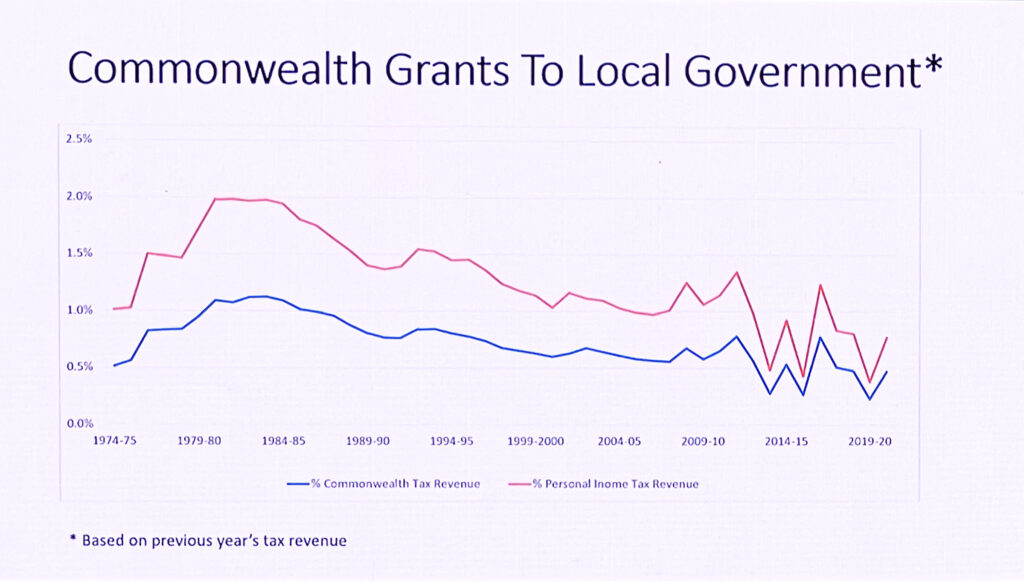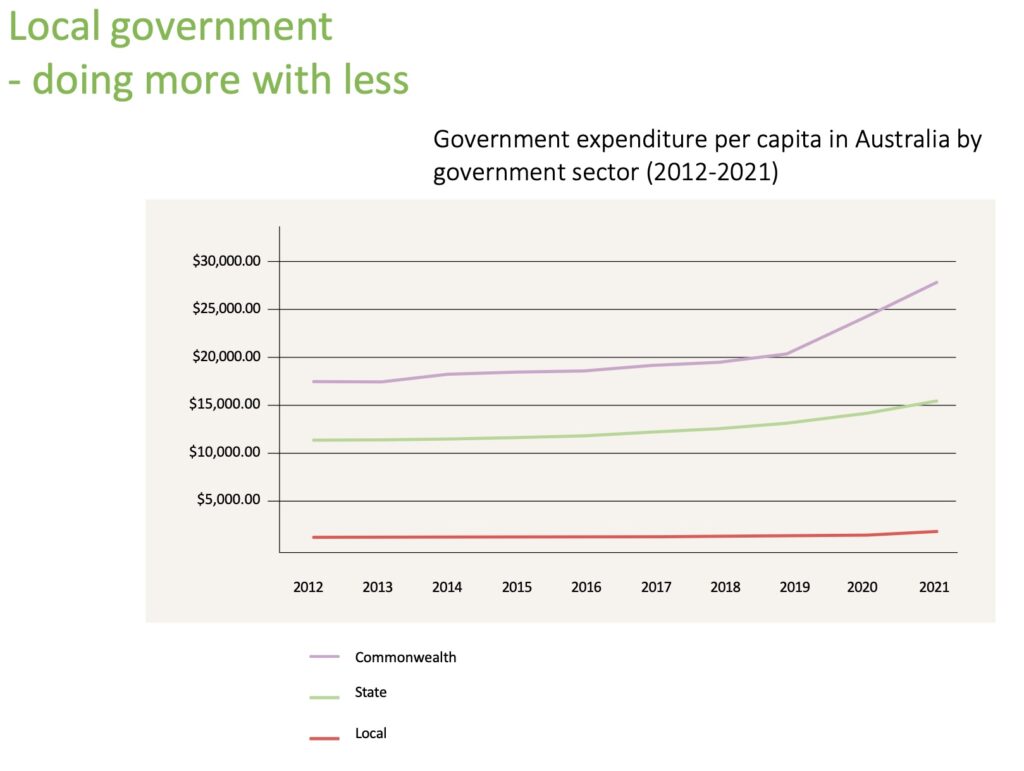Day: July 15, 2022
The Australian Local Government Assembly - What Hawkesbury can learn from a bigger picture, especially as it relates to natural disasters
Just before the floods overtook us all, I attended the Australian Local Government Assembly (ALGA) down in Canberra, an annual conference that pulls together the 537 local governments around Australia.
Our focus is the bigger picture of local government as it relates to the nation as a whole – a perspective that I believe my colleagues often misunderstand because they express little interest in the subject. Only Councillor Lyons-Buckett and Councillor Wheeler have been regular attendees with me over the last six years.
Presciently, a lot of what we heard about was about the increasing cost of natural disasters, and the disproportionate burden placed on Councils in the repair and cleanup.
The evidence is clear: Local Governments are the most disadvantaged tier of Government in Australia. Councils directly take in only 3.5% of all taxation revenue levied across all three tiers of government, and yet Local Governments are responsible for 24% of all public assets and service provision, not to mention planning how our communities can grow and thrive. The balance has to come from a patchwork of grants and programs from State and Federal governments which are neither predictable over time, and which have slipped further and further behind costs as the years have passed.
I'm a believer in the principle of subsidiarity – that decisions consequential to how we live are best made by those who are closest to those effected by any policy. So, I am happy to join my voice to my colleagues in calling to other tiers of government to set things right, both as a crucial reform, and as a nation building exercise.
The video above is my report about what I learned – I pushed through a reform to Council which demanded Councillors give an account to you after they are sent to conferences to prove they were paying attention (the Labor and Liberal Councillors have disappointingly since rescinded that accountability measure). And below I give a small selection of further data gained from conference presentations:
The first relevant figure is that the support given to all Local Governments from Federal taxation revenue has about halved over the last 40 years. It used to be about 1% of all Federal Taxation revenue and now sits at about 0.55%. This includes Roads to Recovery funding and Federal Assistance Grants.
The only revenue Councils can levy directly are through Council rates. In NSW this is constrained by the infamous "Rate Peg" - This year Councils were asked to raise rates by only 0.8% when inflation and costs were rising at a rate above 5% p.a. As a share of all taxation revenue raised in Australia, we've slipped badly despite millions of dollars of cost-shifting to Councils.
Meanwhile, government expenditure per capita has ballooned over the last decade, while the Local Government's ability to invest has remained static. We know Council's get a lot of flack for poor service and potholed roads, but in objective terms, we have been squeezed and squeezed and run an increasingly frugal outfit.
This conclusion is backed up by International data which shows that Local Governments in Australia are very poorly resourced compared to other nations. The above graph comes from a New Zealand study (thus the emphasis), but Australia is there, all the way over at the right, and small fraction compared to many other developed nations.
Local government however remains easily the most trusted tier of government in Australia, and especially among young people.
Lastly, I want to turn to what we heard about the increasing costs of natural disasters, especially in the light of what has just struck our community, again, with catastrophic effect.
We received a briefing from Deloitte which shows starkly what we have been through begins to look like when extrapolated to the largest scale.
Natural disasters are costing our economy $38 Billion in each and every year, and those costs are expected to rise to more than double that within 30 years – both as a result of climate change but also if we fail to adapt, mitigate and improve the resilience of our communities to disaster. The Hawkesbury is clearly at the coal face of this challenge. We were told that 97% of all natural disaster funding is spent after disasters have struck, and yet only 3% of funds are spent proactively to mitigate those events (such as raising Warragamba Dam!) or in building resilience into our communities and infrastructure.
Australia stands to realise a $380BN economic dividend resulting from proactive resilience-planning and climate-adaptation initiatives, and potentially create over 73,000 full time jobs (by 2050) if we begin to act now, in sectors as varied as manufacturing, transport, construction, services and the retail sector.
I attended a briefing from the National Recovery and Resilience Agency. Unaware at the time of what was about to visit us, I pleaded with them to address all the deficiencies in disaster preparedness and response we've just seen again.
I said that since 2020, we have had the worst bushfires in history, a pandemic, and multiple floods, the last of which was the worst in 44 years.
In March, 800 houses on our floodplain were flooded, but 25,000 could be at risk in a worse one, and that this is statistically a certainty over time.
I pointed out that the agency has made a $50m pledge in the 2021-22 “National Flood Mitigation Infrastructure Program” to fund 37 different projects around the country, and yet not a single dollar is earmarked for spending in the Hawkesbury-Nepean – the largest unprotected floodplain in the nation.
I told them that after floods in 2020, 2021 and March 2022, the State government had promised landowners fronting our rivers a streamlined process to perform urgent remedial works to stop their homes, sheds and farms from slumping into the river. Over a year later, we're still waiting despite Council pleading with State ministers, and the inability of landowners to act because red tape imposed by the State government has had catastrophic effects.
Those landowners tell me it would be both cheaper and faster to perform the works illegally and cop a fine than to go through the red tape of commissioning reports in aid of mandatory DA’s that may well cost more than the works those reports are asking to perform. It's not good enough.
I will continue to fight for these urgent reforms, and invite you to follow me on social media for regular updates.







